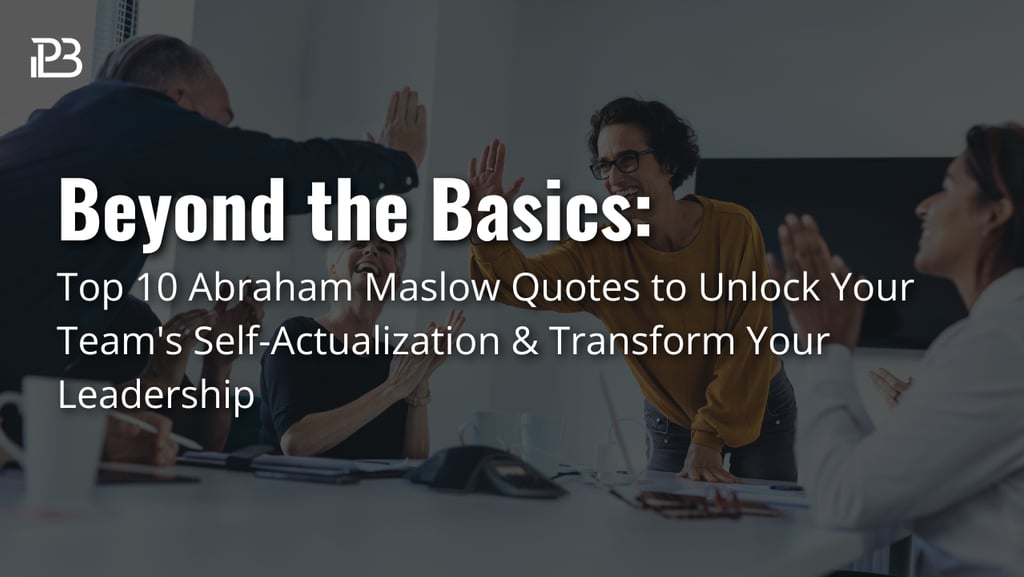Beyond the Basics: Top 10 Abraham Maslow Quotes to Unlock Your Team's Self-Actualization & Transform Your Leadership
Unlock your team's potential! Explore Top 10 Abraham Maslow Quotes and learn how to transform leadership by fostering self-actualization, engagement, and lasting success
TOP 10 QUOTES
10/31/20255 min read


Modern leadership faces many challenges. Employee retention is hard. Engagement often drops. Burnout harms workers and output. Old motivation tactics, like "carrot and stick," no longer work. You need a better way to lead. A way to inspire your team. A way to use their full potential.
Abraham Maslow provides this. His profound ideas, often best understood through his insightful quotes, offer a framework. This framework moves past surface rewards. It meets deep human needs. This drives motivation, commitment, and success. It does not just make people "happy at work." It builds a base for deep growth and new results.
The Modern Leadership Challenge: Why 'Carrot & Stick' Isn't Enough
Employee retention and engagement are crucial in today's fast industries. Turnover costs more than just recruitment fees. It hurts team morale, knowledge, and project flow. Companies want to attract and keep skilled workers.
Many old workplace motivation theories fail. They often use external rewards. These include bonuses, promotions, or fear of bad outcomes. These have some use. But they rarely reach deep human drive. Workers who only seek outside rewards disengage easily. They leave when conditions change or a better offer appears.
Abraham Maslow's ideas offer help here. His work, a cornerstone of motivational psychology, gives a plan to meet deep human needs at work. This leads to satisfaction. It also builds true self-actualization and purpose for your team. It shifts leadership from transactions to transformation.
Rebuilding the Foundation: Fostering Psychological Safety & Belonging
Maslow's Hierarchy of Needs shows that basic human needs must be met first. Higher needs follow. At work, this means starting with the base. This base includes physical and psychological safety in teams. Then comes belonging. These first levels are key for real engagement.
Quote 1 & Application: "Security, stability, dependency, protection, freedom from fear, anxiety and chaos, need for structure, order, law, limits; strength in the protector; and so on."
Leaders must build trust and psychological safety. Create a space where people feel safe. They voice concerns. They offer new ideas. They admit mistakes. They take calculated risks. They do this without fear of punishment or shame. Set clear expectations. Use consistent processes. Give predictable responses. This lets team members be themselves. They bring their full selves to work.
Quote 2 & Application: "We yearn for a feeling of belonging, for identification with a group or collectivity, for an affectionate relationship."
Humans need connection after safety. Leaders build community. Create chances for real interaction. Celebrate team successes. Encourage peer support. This builds stronger relationships. It creates belonging. Your team members feel valued. They are part of the group, not just a small part of a system.
## Empowering Growth: Nurturing Esteem and Respect
After safety and belonging needs are met, people seek esteem and respect. This level matters for team performance. It uses the human desire for recognition, skill, and self-worth.
Quote 3 & Application: "All people have a need or a desire for a stable, firmly based, high evaluation of themselves, for self-respect, or self-esteem, and for the esteem of others."
Leaders meet this need with specific, useful feedback. This feedback shows strengths and growth areas. Celebrate all achievements. This publicly recognizes effort and success. Offer chances for skill mastery and professional growth. This increases competence. It lets people gain confidence. They contribute better.
Quote 4 & Application: "The average person is much more talented and much more creative than we generally give them credit for."
This quote shows why you must see and value each person. Leaders must confirm individual contributions. Seek and appreciate each team member's unique strengths, views, and talents. When people feel valued and respected for their work, their engagement and dedication rise.
## The Apex of Potential: Cultivating Employee Self-Actualization
Employee self-actualization at work means helping people reach their full potential. It helps them find deep meaning in their tasks. This is the top of Maslow's hierarchy. Here, growth and purpose meet.
Quote 5 & Application: "What a man can be, he must be. This need we may call self-actualization."
Your role as a leader involves helping people find their personal purpose. Help them connect this purpose to their jobs. This means understanding their goals. It means creating opportunities. These opportunities let team members do work that matches their deepest values. Helping them become "all they can be" changes a job into a calling.
Quote 6 & Application: "A musician must make music, an artist must paint, a poet must write, if he is to be ultimately at peace with himself."
Leaders create roles and projects that challenge and inspire. Go beyond daily tasks. Use the unique talents and creativity of your team. Give them ways to innovate. Allow them to experiment. Encourage them to offer their unique views for problem-solving. This builds a place where work is not just done. It is truly expressed.
Quote 7 & Application: "In a healthy individual, the drive to self-actualization is not an occasional, but a continuous and all-pervasive process."
Build a culture of constant learning and innovation. Give team members freedom. Give them resources. They explore new skills. They try new methods. They work on projects that excite them. These chances for "peak experiences" – times of deep focus and joy in work – drive personal and professional growth.
Leadership as a Catalyst: Designing a Purpose-Driven Culture
When you support individual self-actualization, it drives group success. Leaders act as catalysts. They design a purpose-driven leadership style and company culture.
Quote 8 & Application: "It looks as if there is a single ultimate value for mankind, a far goal toward which all men strive. This is called self-actualization."
Leaders link individual goals for self-actualization to wider team and company goals. State a clear, shared vision. This vision must match each person's desire for growth and impact. Leaders then promote a purpose-driven method. This joint pursuit of group self-actualization creates a motivated and effective workforce.
Quote 9 & Application: "One can choose to go back toward safety or forward toward growth."
A main leadership duty is to remove barriers to growth. This means clearing old rules. It means giving vital resources. It means offering mentorship and advice. Leaders must also speak for their team's goals. They promote their team's growth. They make ways for them to advance.
Quote 10 & Application: "If you deliberately plan to be less than you are capable of being, then I warn you that you'll be unhappy for the rest of your life."
This statement highlights your deep responsibility as a leader. Leaders must inspire a shared vision. This vision calls for everyone's best. Build a place where human potential is not just seen. It is prioritized, celebrated, and invested in. Leaders create a work environment. In this place, people are always challenged. They get support to reach their top abilities.
Frequently Asked Questions
How do Abraham Maslow's quotes apply to modern leadership?
Abraham Maslow's quotes provide a timeless framework for leaders to understand and address the fundamental human needs of their team members, moving beyond basic incentives to foster psychological safety, belonging, esteem, and ultimately, self-actualization. This approach leads to increased engagement, innovation, and retention.
What is the significance of self-actualization in the workplace?
Self-actualization in the workplace signifies an environment where employees are empowered to reach their full potential, aligning their personal purpose with their professional roles. This not only boosts individual job satisfaction and growth but also drives profound innovation and productivity for the entire organization.
Can applying Maslow's principles truly improve employee retention?
Yes, by focusing on meeting needs beyond just salary – such as safety, belonging, respect, and growth opportunities – leaders create a workplace where employees feel valued and fulfilled. This deep sense of connection and purpose significantly reduces turnover and builds a loyal, committed workforce.
The Return on Humanity: A Thriving Team & Transformative Results
Using Maslow's leadership approach is not just a belief. It is a smart investment. It brings real results. It leads to higher engagement. It lowers employee turnover. It creates a stronger, more flexible workforce. This workforce handles constant change.
A self-actualized team is not just productive. It is innovative. When people use their unique talents, creativity grows. Problem-solving skills get much better. This means higher company performance. It leads to better decisions. It gives a market advantage. This is the goal: build a workplace where every team member thrives. They find purpose. They feel fulfilled. This leads to individual success and deep group success.
Using Maslow's ideas is no longer optional. It is a strategic need. Understand and meet all human needs. Leaders then build strong, innovative, human-focused companies. These companies will meet future challenges and opportunities.
